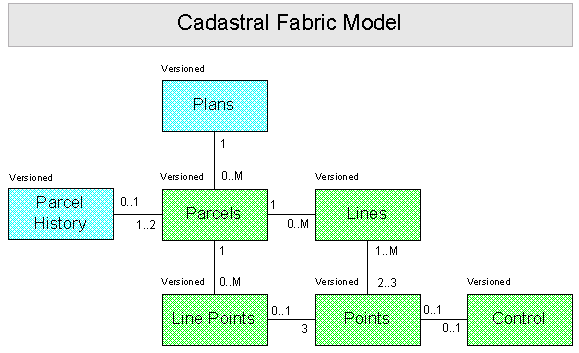 |
This document is archived and information here might be outdated. Recommended version. |
 |
This document is archived and information here might be outdated. Recommended version. |
| ArcObjects Help for .NET developers > ArcObjects namespaces > GeoDatabaseExtensions > ESRI.ArcGIS.GeoDatabaseExtensions > Interfaces > IC > ICadastralFabric Interface (ArcObjects .NET 10.5 SDK) |
Provides access to members that control a cadastral fabric and its associated cadastral jobs.
| Description | ||
|---|---|---|
 |
CadastralJobs | The cadastral jobs that have not been committed. |
 |
CadastralTable | The cadastral fabric class at the specified enumeration. |
 |
CommitJob | Commits the specified job to the cadastral fabric. |
 |
CreateJob | Creates a new cadastral job with the properties of the given CadastralJob object. |
 |
DeleteJob | Deletes the existing job. |
 |
ExtractCadastralPacket | Creates/Extracts a cadastral packet for the specified job. |
 |
GetJob | Retrieves a cadastral job given its name. |
 |
PostCadastralPacket | Saves the cadastral packet for the job. |
 |
UpdateJob | Updates the existing job. |
| CoClasses and Classes | Description |
|---|---|
| CadastralFabric | A container for querying information about a cadastral fabric. |
The cadastral fabric dataset is an extendable data model for the management of parcel data. It comprises a set of fabric classes that support the basis of a land information system.
The cadastral fabric defines 3 key areas of operation:
1. Core Fabric
The core fabric tables are shown in the image below:

By default the accuracy category values are initialized to the following, however these can be changed to fit the values defined by your organization:
| Category | Bearing Std.Dev. (seconds) | Distance Std.Dev. (meters) | ppm | Description |
|---|---|---|---|---|
| 1 | 5.00 | 0.0001 | 5 | 1-Highest |
| 2 | 30.00 | 0.01 | 25 | 2-After 1980 |
| 3 | 60.00 | 0.02 | 50 | 3-1908 to 1980 |
| 4 | 120.00 | 0.05 | 125 | 4-1881 to 1907 |
| 5 | 300.00 | 0.20 | 125 | 5-Before1881 |
| 6 | 3600.00 | 1.00 | 1000 | 6-1800 |
| 7 | 6000.00 | 10.00 | 5000 | 7-Lowest |
2. Job Management
The job management tables allow audit trails of edits to parcels in the cadastral fabric, and these 2 tables also help to manage the edits to parcels and prevention of edit conflicts.
3. Feature Adjustment
Anytime changes to coordinates occur, these are tracked as vectors in the cadastral fabric adjustment tables. These vectors are published by the cadasatral fabric for use to adjust standard feature class layers that are associated with the (subscribe to) the cadastral fabric.